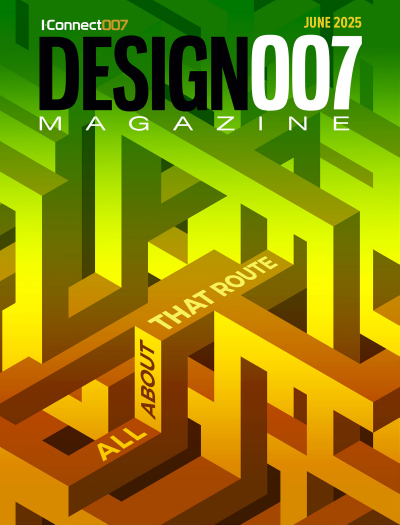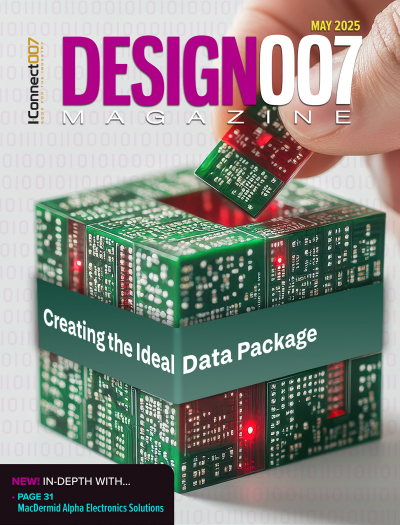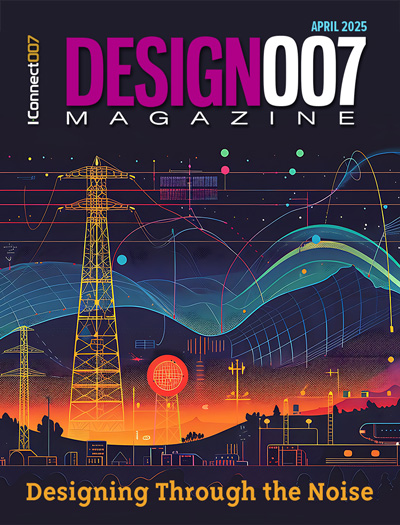-

- News
- Books
Featured Books
- design007 Magazine
Latest Issues
Current Issue
All About That Route
Most designers favor manual routing, but today's interactive autorouters may be changing designers' minds by allowing users more direct control. In this issue, our expert contributors discuss a variety of manual and autorouting strategies.

Creating the Ideal Data Package
Why is it so difficult to create the ideal data package? Many of these simple errors can be alleviated by paying attention to detail—and knowing what issues to look out for. So, this month, our experts weigh in on the best practices for creating the ideal design data package for your design.

Designing Through the Noise
Our experts discuss the constantly evolving world of RF design, including the many tradeoffs, material considerations, and design tips and techniques that designers and design engineers need to know to succeed in this high-frequency realm.
- Articles
- Columns
- Links
- Media kit
||| MENU - design007 Magazine
Workflow Challenges in Fabrication
December 22, 2022 | Andy Shaughnessy, Design007 MagazineEstimated reading time: 2 minutes
Q&A with Paul Cooke
The job of the PCB designer is becoming more complicated every day. Designers are now acting as what amounts to project managers for the PCB, and they must be familiar with the many trade-offs that happen during manufacturing, many of which they can control during the design cycle.
Paul Cooke, the senior director of business development for Ventec International Group, is presenting a class at IPC APEX EXPO 2023 that looks at workflow challenges in fabrication, and the myriad drivers that can affect yield, reliability, and cost. Here he discusses the details of this Professional Development course, what he hopes attendees will take away, and why designers and design engineers would benefit from this class.
Q: Paul, tell us a little about the Professional Development Course on process flow and defects you are teaching at the show.
A: I put this course together to give designers, engineers, etc., a more in-depth look at what happens to their design as it goes through the fabrication process. It looks at how the fabricator adjusts processes to meet the design intent and what happens when it goes wrong; it’s like a [IPC] 2221, 6012, 600, and 9121 course all rolled into one. It shows the complexity of the process and how designs can affect the process flow, yield, quality etc. We talk about reliability, for example, of how something like via size can be affected by aspect ratio, layer count, drill parameters, desmear, and material selection and how they would all interact with each other to affect yield, cost, and reliability.
Q: Why should someone attend your class?
A: It’s for anyone wanting to increase their knowledge of the fabrication process. It is aimed at designers and process engineers at any level. The course is designed to be interactive with a lot of questions and hopefully 30 years of knowledge transfer. Time permitting, we may get to cover some emerging technologies.
Q: This sounds like a great class for PCB designers. What are some of the trade-offs designers should be aware of that can affect yield and reliability?
A: There are many factors affecting yield, reliability, and ultimately cost. We will look at each part of the process, discussing how each can be affected, which attributes of the design have the most impact on yield improvement, and how the fabricator achieves the desired level of release.
Q: What is the most important piece of advice you would give your attendees?
A: Attend the course with a lot of questions and take a lot of notes as we will cover a mountain of information. By the end I hope they have a comprehensive knowledge of the process and learn to always talk to a field application engineer prior to setting out on a new type of design, to eliminate any changes later due to cost, capability, yield, etc.
Q: Is there anything else you’d like to add?
A: I hope they all enjoy the course, and I am always looking for feedback, good or bad, so that I can adapt and improve for future classes.
This article originally appeared in the December 2022 issue of Design007 Magazine.
Suggested Items
DownStream Acquisition Fits Siemens’ ‘Left-Shift’ Model
06/26/2025 | Andy Shaughnessy, I-Connect007I recently spoke to DownStream Technologies founder Joe Clark about the company’s acquisition by Siemens. We were later joined by A.J. Incorvaia, Siemens’ senior VP of electronic board systems. Joe discussed how he, Rick Almeida, and Ken Tepper launched the company in the months after 9/11 and how the acquisition came about. A.J. provides some background on the acquisition and explains why the companies’ tools are complementary.
Elementary Mr. Watson: Retro Routers vs. Modern Boards—The Silent Struggle on Your Screen
06/26/2025 | John Watson -- Column: Elementary, Mr. WatsonThere's a story about a young woman preparing a holiday ham. Before putting it in the pan, she cuts off the ends. When asked why, she shrugs and says, "That's how my mom always did it." She asks her mother, who gives the same answer. Eventually, the question reaches Grandma, who laughs and says, "Oh, I only cut the ends off because my pan was too small." This story is a powerful analogy for how many PCB designers approach routing today.
Connect the Dots: The Future of PCB Design and Manufacturing
07/02/2025 | Matt Stevenson -- Column: Connect the DotsFor some time, I have been discussing the increasing complexity of PCBs and how designers can address the constantly evolving design requirements associated with them. My book, "The Printed Circuit Designer’s Guide to… Designing for Reality," details best practices for creating manufacturable boards in a modern production environment.
Siemens Turbocharges Semiconductor and PCB Design Portfolio with Generative and Agentic AI
06/24/2025 | SiemensAt the 2025 Design Automation Conference, Siemens Digital Industries Software today unveiled its AI-enhanced toolset for the EDA design flow.
Cadence AI Autorouter May Transform the Landscape
06/19/2025 | Andy Shaughnessy, Design007 MagazinePatrick Davis, product management director with Cadence Design Systems, discusses advancements in autorouting technology, including AI. He emphasizes a holistic approach that enhances placement and power distribution before routing. He points out that younger engineers seem more likely to embrace autorouting, while the veteran designers are still wary of giving up too much control. Will AI help autorouters finally gain industry-wide acceptance?


